By Montserrat Legorreta, GNI Membership and Program Associate, and Samaya Anjum, GNI Policy and Communications Associate
Since the early days of the Internet, multistakeholderism has been a cornerstone of its governance, ensuring the safeguarding of openness, interoperability, inclusivity, and the global nature of the digital ecosystem. This approach brings together diverse actors – governments, private sector, civil society, and technical experts – to collaboratively develop policies that reflect a broad range of interests and expertise. The Internet Governance Forum (IGF) embodies this spirit, and provides an essential global platform where these voices can converge to discuss pressing digital challenges, even as the digital landscape grows more complex amid geopolitical tensions and rapid technological change.
IGF 2025 in Norway was no different. It served as a space where topics such as Artificial Intelligence (AI) governance, digital rights, cybersecurity, and investment responsibility could be explored through open dialogue – issues that are increasingly difficult to deliberate on across other global policy forums. In this sense, the IGF continues to play a vital role not only in shaping policy discussions, but in sustaining trust and transparency among actors with different, and at times competing, priorities.
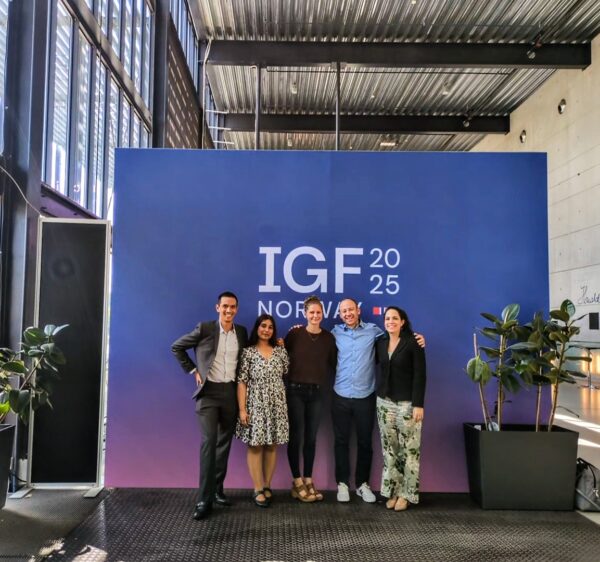
The Global Network Initiative team at the IGF 2025
However, multistakeholderism itself is not immune to pressure. Questions around the future of the IGF, particularly the renewal of its mandate reflect broader concerns about the resilience and relevance of inclusive governance models in an increasingly fragmented digital world. These questions are surfacing in the context of the World Summit on the Information Society 20-year review (WSIS+20), a critical process that will influence how global digital governance is structured going forward and provide an important opportunity to reaffirm commitments to multistakeholder principles and the protection of human rights online. At a time when governments and other powerful actors are asserting greater control over digital spaces, it is essential to reaffirm the value of multistakeholder processes that foster openness, accountability, and shared responsibility.
GNI’s participation at IGF 2025 was grounded in our long-standing commitment to advancing rights-respecting governance through meaningful, cross-sector collaboration. Throughout the week, we convened and contributed to a range of sessions that reflected both the complexity of the current moment and the opportunities that multistakeholder spaces can offer when they are genuinely inclusive:
GNI Q2 Board Meeting
In parallel with our public-facing engagement at IGF, GNI held its Q2 Board Meeting at Telenor’s headquarters in Fornebu. As part of this meeting, we hosted a learning session on responsible company practices in conflict-affected and politically volatile environments, using the recent Monsoon Revolution in Bangladesh as a case study.
Also read: Exploring Tech Company Responsibility in Armed Conflict
The discussion offered practical insights into how GNI members and stakeholders are applying rights-based frameworks in high-risk contexts, and how multistakeholder dialogue can support responsible business conduct and digital resilience.
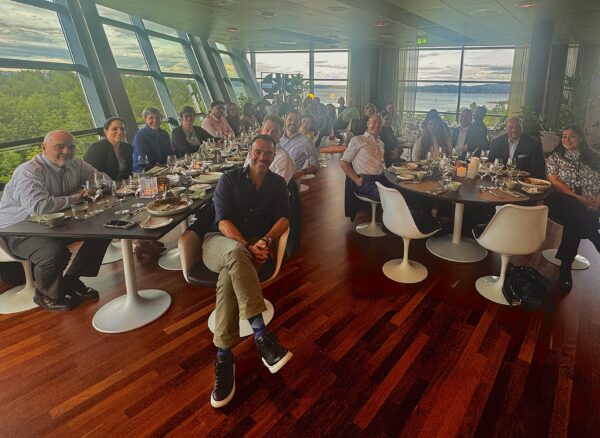
GNI Board dinner at the Telenor Expo in Fornebu, Norway
IGF Sessions and Side events
- GNI took advantage of the space the IGF provides to organize a variety of truly multistakeholder meetings including a panel on Incorporating Human Rights in AI Risk Management alongside member organizations Women at the Table, Google, the Centre for Communication Governance (CCG) at the National Law University Delhi, Telenor, and the UN Office of the High Commissioner on Human Rights.
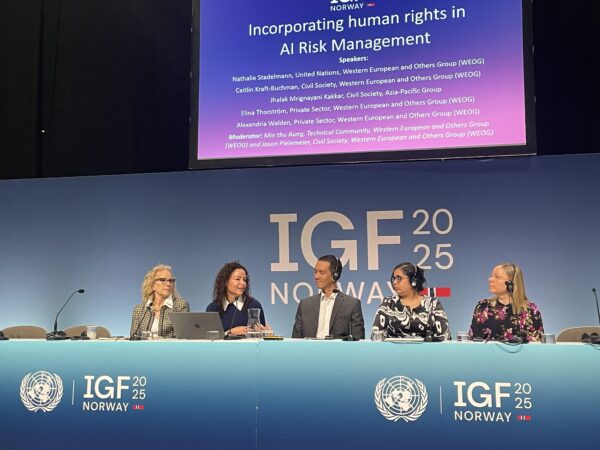
GNI organized a panel on “Incorporating Human Rights in AI Risk Management”
- GNI also collaborated with the Council on Ethics for the Swedish National Pension Funds, on behalf of the Big Tech & Human Rights Investor Collaboration to convene a private roundtable of investors, companies, and civil society representatives to talk about the role of investors in tech governance.
- GNI, together with the Electronic Frontier Foundation and Global Partners Digital (GPD), convened a private meeting of company and civil society representatives to discuss ongoing engagement around the UN Convention Against Cybercrime.
- Finally, GNI and GPD also launched a research output supported by the Internet Corporation for Assigned Names and Numbers (ICANN): The Road to WSIS+20: Key Country Perspectives in the Twenty-Year Review of the World Summit on the Information Society. This research compendium was informed by six national workshops and one regional workshop in countries across Latin America, Asia, and Africa. Partners gathered to present key findings to the Co-Facilitators of the WSIS+20 review process – the permanent representatives of Albania and Kenya.
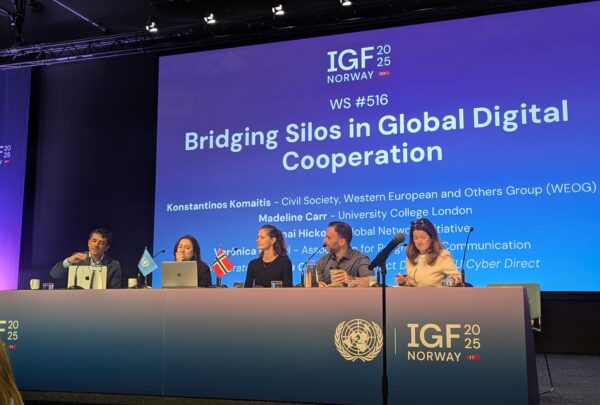
GNI Managing Director Elonnai Hickok spoke at a panel on “Bridging Silos in Global Digital Cooperation”
GNI’s participation at IGF 2025 reaffirmed the value of multistakeholder dialogue in tackling complex and politically sensitive issues – from AI risk management to responsible business conduct in high-risk environments. In our sessions, we saw how collaborative spaces can generate practical insights, such as how rights-based frameworks are being applied in conflict-affected regions, and how investors are increasingly engaging with tech governance from a human rights lens. These engagements highlighted that inclusive governance isn’t just a principle – it’s a necessary condition for building trust, surfacing solutions, and ensuring accountability in digital policymaking.
Looking Ahead
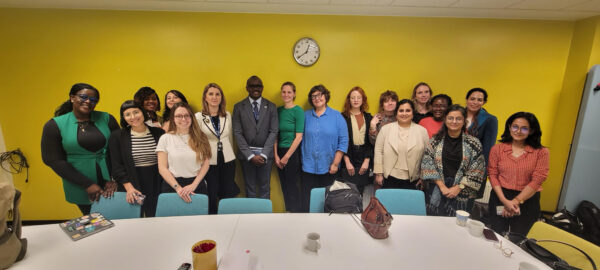
GNI, GPD, and our partners in the ICANN-supported project on the WSIS+20 process meet with the WSIS Co-Facilitators
Over the years, GNI has actively contributed to global Internet governance by promoting frameworks that embed human rights into digital policy and corporate practice. Through formal submissions, public commentary, and internal dialogues, we’ve engaged processes such as the UN Cybercrime Convention, the Global Digital Compact, and the WSIS+20 review to advocate for inclusive, transparent, and accountable governance models. GNI’s multistakeholder composition enables us to surface diverse perspectives – particularly from the private sector and civil society – and to promote practical approaches to shared challenges such as content regulation, surveillance, and cross-border data flows.
Our priorities remain clear: strengthening human rights safeguards, ensuring meaningful participation from Global Majority actors, and reinforcing the legitimacy of multistakeholder institutions as the foundation of global digital cooperation. Moving forward, GNI will continue to contribute constructively to Internet governance processes that shape the future of rights online. We will engage through, in collaboration with the Global Partners Digital, on Shaping the WSIS+20 Review for a Unified Internet Multistakeholderism – a project supported by the inaugural ICANN grant – to support inclusive participation in the WSIS+20 review, offer expert input on the implementation of the Global Digital Compact, and deepen cross-sector coordination on emerging issues such as AI governance, intermediary liability, and digital safety. As multistakeholderism faces political and institutional challenges, GNI will remain focused on protecting the spaces where collaborative governance can thrive – and on equipping our members with the tools, relationships, and insights they need to advance human rights in complex and evolving digital contexts.